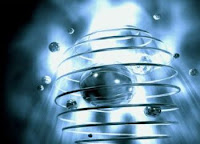Science facts about quantum mechanics and quantum particles
Quantum mechanics is basically set of different principles that describes the physical reality of the matter at atomic and subatomic level. Its origin is quantum theory that began with the study of the interactions of matter and radiation in the early years of the 20th century. Quantum theory is all about the exploring the nature of the matter by exploring its tiniest pieces (subatomic level).
Planck's constant is very important to quantum theory and quantum mechanics in general. It states that the energy of each quantum is equal to the frequency of the radiation multiplied by the universal constant: E=f*h, where h is 6.63 * 10E-34 Js.
Quantum mechanics can be referred to as the mathematical description of physical reality of the matter, like almost any other scientific model. According to quantum mechanics the most complete description we can make of a system is its wavefunction, which is mathematically speaking just a number varying between time and place.
Quantum theory can provide accurate descriptions for phenomenons such as black body radiation and the stability of electron orbitals.
The famous quantum theory of the atom was primarily developed as an explanation for the electron's staying in its orbital, which couldn't at that time be explained by Newton's laws of motion.
Quantum particles have one very unique property, namely they can be in different states at the same time. This is referred to as the "superposition" of two conditions. Based on this for instance the 'spin' of an electron can be pointing in two different directions at once.
Many scientists believe that super-fast quantum computer are only matter of time.
Quantum computers have also unlimited potential and they are likely able to fix problems that would normally take millions of years to solve, much faster than ordinary computers. Currently the biggest problem with development of quantum computers is that scientists can only hold a limited number of atoms in place for a very short period of time.
Quantum mechanics allows a quantum computer built on these principles (still theoretical, to perform tasks that are currently thought impossible to do efficiently on a normal computer, for instance breaking with ease all currently possible encryption standards.
Quantum mechanics plays key role for understanding how individual atoms combine covalently to form chemicals or molecules, and is so well used in chemistry that is even known under the name of quantum chemistry.
Quantum mechanics has had significant impact on today's modern technology such as lasers, transistors and diodes.
Planck's constant is very important to quantum theory and quantum mechanics in general. It states that the energy of each quantum is equal to the frequency of the radiation multiplied by the universal constant: E=f*h, where h is 6.63 * 10E-34 Js.
Quantum mechanics can be referred to as the mathematical description of physical reality of the matter, like almost any other scientific model. According to quantum mechanics the most complete description we can make of a system is its wavefunction, which is mathematically speaking just a number varying between time and place.
Quantum theory can provide accurate descriptions for phenomenons such as black body radiation and the stability of electron orbitals.
The famous quantum theory of the atom was primarily developed as an explanation for the electron's staying in its orbital, which couldn't at that time be explained by Newton's laws of motion.
Quantum particles have one very unique property, namely they can be in different states at the same time. This is referred to as the "superposition" of two conditions. Based on this for instance the 'spin' of an electron can be pointing in two different directions at once.
Many scientists believe that super-fast quantum computer are only matter of time.
Quantum computers have also unlimited potential and they are likely able to fix problems that would normally take millions of years to solve, much faster than ordinary computers. Currently the biggest problem with development of quantum computers is that scientists can only hold a limited number of atoms in place for a very short period of time.
Quantum mechanics allows a quantum computer built on these principles (still theoretical, to perform tasks that are currently thought impossible to do efficiently on a normal computer, for instance breaking with ease all currently possible encryption standards.
Quantum mechanics plays key role for understanding how individual atoms combine covalently to form chemicals or molecules, and is so well used in chemistry that is even known under the name of quantum chemistry.
Quantum mechanics has had significant impact on today's modern technology such as lasers, transistors and diodes.


0 comments:
Post a Comment